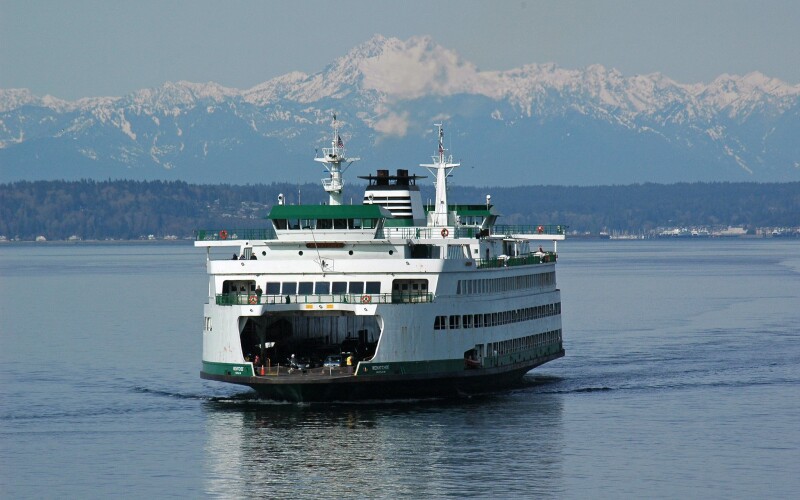A program to convert up to three Washington State Ferries (WSF) vessels to hybrid-electric propulsion will be put on hold in a move aimed at prioritizing the state ferry system's return to full service, Gov. Bob Ferguson announced on Thursday.
The move will ensure that by this summer, 18 ferries will be operating — the highest number since 2019 — bringing the system closer to full service, which requires 21 vessels with 18 operational at any given time.
The governor's decision pauses a $100 million program awarded to Vigor, LLC, Portland Ore., in 2023 for the conversion of Jumbo Mark II-class ferries Wenatchee and the Tacoma, to plug-in hybrid-electric propulsion. The deal included a $50 million option for the conversion of a third ferry, the Puyallup.
The largest vessels in the WSF fleet, the 460'2"x90' Jumbo Mark II-class ferries, built between 1997 and 1999 at Todd Pacific Shipyards, Seattle, can each carry up to 2,500 passengers and 202 vehicles. The double-ended ferries are also WSF's biggest emitters, contributing 26% of the service’s greenhouse gas emissions.
The conversion of the first vessel, the Wenatchee, is underway at Vigor's Harbor Island shipyard in Seattle, and the ferry is slated to return with hybrid-electric capabilities by early summer. The Tacoma and Puyallup conversions are being postponed.
Several setbacks have hindered the Wenatchee conversion, including difficulties trying to fit the new technology into the existing hull. The project is significantly behind schedule and at least $36 million over budget.
The conversions require the ferries to be removed from service for long periods of time, and rather than continue with the long and costly project, Ferguson is prioritizing restoring full ferry service, which has been significantly reduced since the Covid-19 pandemic. Commuters have been facing longer wait times, especially between Bremerton and Seattle, where travelers often experience delays of more than two hours.
“Washingtonians count on fast, reliable ferries to get to work and access critical services,” said Ferguson, who was sworn in as governor on Jan. 15. “We must do everything we can to fully restore ferry service to pre-pandemic levels. This decision immediately improves customer service and centers the people.”
Ferguson said he would revisit the program after the 2026 World Cup, which runs from June 26 to July 6.
With the hybrid-electric conversion on hold, WSF will continue the process of procuring up to five new electric vessels, with bids set to open in early April. The state aims to sign a contract by late May.
The governor also announced the promotion of WSF head Steve Nevey to the position of deputy transportation secretary. Nevey will work closely with transportation secretary Julie Meredith, participating in cabinet meetings to provide updates on ferry service improvements.
Nevey expressed his support for the governor's decision: “Governor Ferguson’s decision to delay these hybrid-electric conversions is the first step toward achieving a long-term vision for improved ferry service in Washington,” he said. “Our work is not done, but this puts us on track to fully restore and maintain service levels Washingtonians rely on.”
Ferguson’s plan also includes continued efforts to meet with island communities affected by ferry disruptions. The governor has already met with residents of Whidbey Island and will visit the San Juan Islands on July 15 to hear directly from affected communities. These meetings will help guide future decisions on ferry service and infrastructure.
To address workforce challenges, WSF is focusing on recruitment, retention, and training to stabilize the workforce. Ferguson has also committed to supporting compensation increases for ferry workers as part of a $26 million agreement with state legislature.
Looking ahead, Ferguson outlined a long-term strategy for acquiring new electric vessels. Following the procurement of up to five new electric ferries, Washington State Ferries will need to replace an additional 11 vessels by 2040. The state will "explore innovative solutions for getting new boats in the water as quickly as possible," including leasing new ferries before taking ownership.




